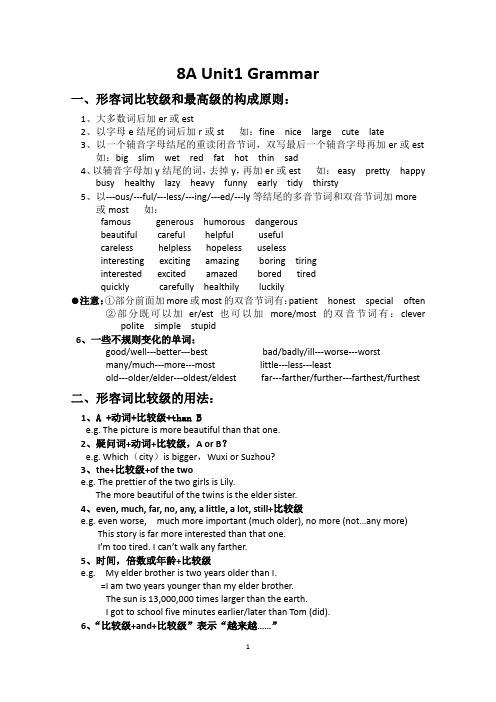形容词比较级和最高级的构词规则
- 格式:doc
- 大小:56.50 KB
- 文档页数:4

形容词的比较级和最高级的变化规则形容词是我们日常表达中不可或缺的一部分,通过使用形容词的比较级和最高级,我们能够更准确地描述物体、人或事物之间的差异和层次。
下面将为大家介绍形容词比较级和最高级的变化规则。
一、一般规则1. 单音节形容词和部分双音节形容词,在其后面加-er构成比较级,-est构成最高级。
例如:small(小)- smaller(更小)- smallest(最小)tall(高)- taller(更高)- tallest(最高)2. 以-y结尾的形容词,去掉末尾的-y,改成-i,再加-er构成比较级,-iest构成最高级。
例如:happy(快乐)- happier(更快乐)- happiest(最快乐)3. 以辅音字母+y结尾的形容词,去掉末尾的-y,改成-i,再加-er构成比较级,-iest构成最高级。
例如:pretty(漂亮)- prettier(更漂亮)- prettiest(最漂亮)4. 以-e结尾的形容词,直接加-r构成比较级,-st构成最高级。
例如:large(大)- larger(更大)- largest(最大)二、特殊规则1. 以重读闭音节结尾的形容词,双写最后一个辅音字母,再加-er构成比较级,-est构成最高级。
例如:big(大)- bigger(更大)- biggest(最大)hot(热)- hotter(更热)- hottest(最热)2. 部分形容词的比较级和最高级形式有规则变化。
例如:good(好)- better(更好)- best(最好)bad(坏)- worse(更坏)- worst(最坏)far(远)- farther/further(更远)- farthest/furthest(最远)3. 部分形容词的比较级和最高级形式不规则,需记忆。
例如:little(小)- less(较小)- least(最小)much(多)- more(更多)- most(最多)三、注意事项1. 两个或两个以上的形容词连用时,一般在第一个形容词前加the,其他形容词按照比较级或最高级的形式来使用。


1.单音节形容词-一般情况:在词尾加-er构成比较级,加-est构成最高级。
例如:-原级:tall(高的),比较级是taller,最高级是tallest。
-原级:small(小的),比较级是smaller,最高级是smallest。
-以-e结尾的词:比较级直接加-r,最高级直接加-st。
例如:-原级:nice(美好的),比较级是nicer,最高级是nicest。
-原级:large(大的),比较级是larger,最高级是largest。
-以重读闭音节结尾,且末尾只有一个辅音字母的词:先双写这个辅音字母,再加-er构成比较级,加-est构成最高级。
例如:-原级:big(大的),比较级是bigger,最高级是biggest。
-原级:hot(热的),比较级是hotter,最高级是hottest。
-以“辅音字母+ y”结尾的词:变y为i,再加-er构成比较级,加-est构成最高级。
例如:-原级:happy(快乐的),比较级是happier,最高级是happiest。
-原级:easy(容易的),比较级是easier,最高级是easiest。
2.双音节形容词-一般情况:在前面加more构成比较级,加most构成最高级。
例如:-原级:careful(仔细的),比较级是more careful,最高级是most careful。
-原级:useful(有用的),比较级是more useful,最高级是most useful。
-以-y、-er、-ow、-ble结尾的双音节词:比较级可以在词尾加-er,最高级可以在词尾加-est,也可以采用前面加more/most的方式。
例如:-原级:clever(聪明的),比较级可以是cleverer或more clever,最高级可以是cleverest或most clever。
-原级:narrow(狭窄的),比较级可以是narrower或more narrow,最高级可以是narrowest或most narrow。

8A Unit1 Grammar一、形容词比较级和最高级的构成原则:1、大多数词后加er或est2、以字母e结尾的词后加r或st 如:fine nice large cute late3、以一个辅音字母结尾的重读闭音节词,双写最后一个辅音字母再加er或est如:big slim wet red fat hot thin sad4、以辅音字母加y结尾的词,去掉y,再加er或est 如:easy pretty happybusy healthy lazy heavy funny early tidy thirsty5、以---ous/---ful/---less/---ing/---ed/---ly等结尾的多音节词和双音节词加more或most 如:famous generous humorous dangerousbeautiful careful helpful usefulcareless helpless hopeless uselessinteresting exciting amazing boring tiringinterested excited amazed bored tiredquickly carefully healthily luckily●注意:①部分前面加more或most的双音节词有:patient honest special often②部分既可以加er/est 也可以加more/most的双音节词有:cleverpolite simple stupid6、一些不规则变化的单词:good/well---better---best bad/badly/ill---worse---worstmany/much---more---most little---less---leastold---older/elder---oldest/eldest far---farther/further---farthest/furthest二、形容词比较级的用法:1、A +动词+比较级+than Be.g. The picture is more beautiful than that one.2、疑问词+动词+比较级,A or B?e.g. Which(city)is bigger,Wuxi or Suzhou?3、the+比较级+of the twoe.g. The prettier of the two girls is Lily.The more beautiful of the twins is the elder sister.4、even, much, far, no, any, a little, a lot, still+比较级e.g. even worse, much more important (much older), no more (not…any more)This story is far more interested than that one.I’m too tired. I can’t walk any farther.5、时间,倍数或年龄+比较级e.g. My elder brother is two years older than I.=I am two years younger than my elder brother.The sun is 13,000,000 times larger than the earth.I got to school five minutes earlier/later than Tom (did).6、“比较级+and+比较级”表示“越来越……”e.g. He is getting fatter and fatter.Our country is becoming more and more beautiful.7、“the+比较级(主语+谓语),the +比较级(主语+谓语)”表示“越……(就)越……”e.g. The sooner, the better.The more careful you are, the fewer mistakes you will make.●注意点:1、比较的两个对象要一致(人比人,物比物)。

比较级最高级变化规则总结在英语学习中,比较级和最高级是非常重要的语法知识点。
它们用于描述事物之间的程度差异,帮助我们更准确、生动地表达想法。
下面就来详细总结一下比较级和最高级的变化规则。
一、形容词和副词比较级和最高级的构成规则1、一般情况单音节词和少数双音节词,直接在词尾加 er 构成比较级,加 est 构成最高级。
例如:tall(高的) taller tallest例如:short(矮的) shorter shortest例如:fast(快的) faster fastest以不发音的 e 结尾的单音节词,直接在词尾加 r 构成比较级,加 st 构成最高级。
例如:nice(好的) nicer nicest例如:large(大的) larger largest以重读闭音节结尾,且末尾只有一个辅音字母的词,要先双写这个辅音字母,再加 er 构成比较级,加 est 构成最高级。
例如:big(大的) bigger biggest例如:hot(热的) hotter hottest例如:thin(瘦的) thinner thinnest2、多音节词和部分双音节词在词前加 more 构成比较级,加 most 构成最高级。
例如:beautiful(美丽的) more beautiful most beautiful例如:important(重要的) more important most important例如:difficult(困难的) more difficult most difficult3、不规则变化有些形容词和副词的比较级和最高级变化是不规则的,需要特别记忆。
例如:good(好的) better best例如:bad(坏的) worse worst例如:many / much(许多) more most例如:little(少的) less least例如:far(远的) farther / further farthest / furthest二、比较级和最高级的用法1、比较级的用法表示两者之间的比较,常用“than”连接。

形容词变比较级和最高级的规则形容词的比较级和最高级是用来表示物品或人在性质、数量或程度上的相对大小或最高程度的词语形式。
根据不同的形容词,有不同的规则来构成比较级和最高级。
1.一般规则:-对于单音节形容词或少部分双音节形容词,比较级在原形后加-er,最高级在原形后加-est。
例如:big(大)→ bigger(更大)→ biggest(最大)-对于以辅音字母+y结尾的形容词,将y改为i,再加-er或-est。
例如:happy(快乐)→ happier(更快乐)→ happiest(最快乐)-对于以字母e结尾的形容词,直接加-er或-est。
例如:nice(好的)→ nicer(更好的)→ nicest(最好的)2.双音节及多音节形容词:-对于多音节形容词或以y结尾的多音节形容词,使用more(更)和the most(最)来构成比较级和最高级。
例如:beautiful(美丽)→ more beautiful(更美丽)→ the most beautiful(最美丽的)-对于少数以-er结尾或-ful结尾的多音节形容词,可以使用-er或-est构成比较级和最高级。
例如:clever(聪明的)→ cleverer (更聪明的)→ cleverest(最聪明的)需要注意的是,有一些形容词的比较级和最高级变化不遵循以上规则,而是使用完全不同的词来表示,例如good(好)→ better(更好)→ best(最好), bad(坏)→ worse(更糟)→ worst(最糟)。
此外,还可以使用"as...as"来表示两者相等的程度,例如:asbig as(和...一样大)、as beautiful as(和...一样美丽)。
同时,有些形容词在比较级和最高级前需要加上副词"much"或"far"来表示程度的增加,例如:much bigger(更大得多)、farthest(最远的)。
英语中的形容词比较级和最高级如何构成?在英语中,形容词的比较级和最高级可以通过以下规则构成:1. 比较级的构成:-一般情况下,在形容词的词尾加上-er:tall(高)→ taller(更高)-如果形容词以字母"e"结尾,只需在词尾加上-r:large(大)→ larger(更大)-如果形容词以辅音字母+y结尾,将"y"变为"i",再加上-er:happy(快乐)→ happier(更快乐)-如果形容词以重读闭音节结尾,且末尾只有一个辅音字母,双写该辅音字母,并加上-er:big(大)→ bigger(更大)2. 最高级的构成:-一般情况下,在形容词的词尾加上-est:tall(高)→ tallest(最高)-如果形容词以字母"e"结尾,只需在词尾加上-st:large(大)→ largest(最大)-如果形容词以辅音字母+y结尾,将"y"变为"i",再加上-est:happy(快乐)→ happiest (最快乐)-如果形容词以重读闭音节结尾,且末尾只有一个辅音字母,双写该辅音字母,并加上-est:big(大)→ biggest(最大)需要注意的是,有一些形容词的比较级和最高级形式是不规则的,需要记忆:- good(好)→ better(更好)→ best(最好)- bad(坏)→ worse(更坏)→ worst(最坏)- far(远)→ farther/further(更远)→ farthest/furthest(最远)此外,有一些形容词的比较级和最高级形式是使用"more"和"most"来构成的,而不是通过词尾的变化:- beautiful(美丽)→ more beautiful(更美丽)→ most beautiful(最美丽)- intelligent(聪明)→ more intelligent(更聪明)→ most intelligent(最聪明)掌握形容词比较级和最高级的构成规则是提高英语语法准确性和表达能力的关键之一。
形容词副词的比较级和最高级变化规则1.在一般情况下,在单音节形容词和部分双音节形容词前直接加上-er 或-est,如big-bigger-biggest。
2.对于以不发音e结尾的形容词,只需在后面添加-r或-st,如late-later-latest。
3.对于以一个辅音字母加一个元音字母结尾的重读闭音节形容词,要双写最后一个辅音字母再加-r或-st,如big-bigger-biggest。
4.对于以辅音字母+y结尾的形容词,变y为i再加-er或-est,如happy-happier-happiest。
5.对于多音节形容词和一些双音节形容词,前面要加more/most,如beautiful-more beautiful-most beautiful。
6.以e结尾的双音节形容词的比较级和最高级前面要加more/most,如polite-more polite-most polite。
7.以y结尾的多音节形容词要先变y为i再加more/most,如friendly-more friendly-most friendly。
8.以ow结尾的形容词一般直接在前面加more/most,如narrow-more narrow-most narrow。
9.以-ic结尾的形容词直接在前面加more/most,如basic-more basic-most basic。
10.以-ive结尾的形容词直接在前面加more/most,如active-more active-most active。
11.以-able结尾的形容词直接在前面加more/most,如comfortable-more comfortable-most comfortable。
12.以-ful结尾的形容词直接在前面加more/most,如beautiful-more beautiful-most beautiful。
13.以-al结尾的形容词直接在前面加more/most,如usual-more usual-most usual。
形容词比较级和最高级变化规则形容词级的变化规律和级的用法:一、形容词级的变化:1、规律变化:单音词的变化:(四条)①一般情况:+er(比较级) +est(最高级)eg :quiet--quieter--the quietestbright--brighter---the brightest 明亮/聪明的dear--dearest--the dearestclever--cleverer--the cleverest②词末为--e(不发音)+ r --+steg:fine--finer--the finestnice--nicer--the nicestcute--cuter--the cutestclose--closer--the closestwhite--whiter--the whitestlarge--larger--the largestfree--freer--freest(特殊)③重读闭音节,末尾只有一个辅音字母的:双写辅音字母+er--双写辅音字母+esteg:hot--hotter--the hottestbig --bigger--the biggestred--redder--the reddestwet--wetter--the wettestsad--sadder--the saddestfat--fatter--the fattestthin--thinner--the thinnestfit--fitter--fittest④少数以辅音字母+y结尾的双音节原根词:变y为i+er 变y为i+est形容词和副词用法比较形容词和副词形容词和副词在语法结构中主要用于比较级和最高级。
形容词和副词的构成形式基本上一样,它们的形式与单音节、双音节和多音节有关,当然还有其特殊形式。
形容词和副词比较级的基本用法分为同级比较、比较级和最高级三种形式。
但这三种形式都有它们特殊的表达方式以及它们的惯用法。
英语中形容词和副词的比较级和最高级的规则是什么?一、一般规则1.单音节词和少数双音节词:一般在词尾加-er 构成比较级,加-est 构成最高级。
例如:●tall(高的)→ taller(更高的)→ tallest(最高的);●short(短的)→ shorter(更短的)→ shortest(最短的);●fast(快的)→ faster(更快的)→ fastest(最快的)。
2.以字母 e 结尾的词:直接加-r 构成比较级,加-st 构成最高级。
例如:●nice(好的)→ nicer(更好的)→ nicest(最好的);●large(大的)→ larger(更大的)→ largest(最大的)。
3.以“辅音字母 + y”结尾的词:先把 y 改为 i,再加-er 构成比较级,加-est 构成最高级。
例如:●happy(快乐的)→ happier(更快乐的)→ happiest(最快乐的);●busy(忙碌的)→ busier(更忙碌的)→ busiest(最忙碌的)。
4.重读闭音节词(即:辅音+元音+辅音):双写末尾的辅音字母,再加-er 构成比较级,加-est 构成最高级。
例如:●big(大的)→ bigger(更大的)→ biggest(最大的);●hot(热的)→ hotter(更热的)→ hottest(最热的)。
二、多音节词和部分双音节词在前面加 more 构成比较级,加 most 构成最高级。
例如:●beautiful(美丽的)→ more beautiful(更美丽的)→ mostbeautiful(最美丽的);●important(重要的)→ more important(更重要的)→ mostimportant(最重要的)。
三、不规则变化有些形容词和副词的比较级和最高级是不规则的,需要单独记忆。
例如:●good/well(好)→ better(更好)→ best(最好);●bad/badly/ill(坏)→ worse(更坏)→ worst(最坏);●many/much(多)→ more(更多)→ most(最多);●little(少)→ less(更少)→ least(最少);●far(远)→ farther/further(更远)→ farthest/furthest(最远)。
少年易学老难成,一寸光阴不可轻- 百度文库形容词比较级和最高级
young ______long ______full ______short ______small ______few ______hungry ______early ______
heavy ______
healthy ______
big ______
red ______
wet ______
hot ______
many ______
ill ______
little ______
famous ______
exciting ______
carefully ______
规则变化
❖ 1.单音节和少数双音节单词,一般在词尾加“er”或“est”。
❖clean, tall, small, cheap , short, long, light, high
❖ 2. 以不发音字母“e”结尾的单词,直接在词尾加“r”或“st”。
“est”。
He sings as well as Jack. He doesn’t sing as(so) well as Jack.
2. as much as, as many as 与…一样多
eg. I have done as much work as he did yesterday.
You can take as many books as you can.
II. 比较级用法:
1. 比较级+than
2.比较级+and+比较级, 表示“越来越”
eg. warmer and warmer, nicer and nicer,
more and more beautiful, more and more fun
3.the+比较级… the+ 比较级
eg. The more you read the book, the more interesting you found .
*** 4. 比较级的修饰语有: much, far, even, a little, a lot, a bit, rather, still, a great deal (大量) + adj./adv. 比较级5. 当比较级后没有than, 而为of the two的结构,比较级前加the.
eg. The taller of the two girls is Mary.
III.最高级用法:
1. 形容词最高级用于in, of 或among的结构中, 形容词最高级前+the
eg I am the best of (among)the three.
He is the thinnest boy in my class.
2. 副词最高级不需+the eg. Jim goes to bed latest in my family.)
2. 比较级和最高级互换(比较时要把自己排除在外。
注意比较的范围)
eg. Shanghai is the largest city in China.
Shanghai is larger than any other in China.
Shanghai is larger than any city in Africa.
Ex:
IV. Others
*
•
•
•
•
•
** adj.&adv:
1.
A.
A.early
A.early
A.good
A.tall
A. high
7. Of all the stars the sun is to us.
A.close
B. closer
C. closest
D. the closest
8. Barbara felt much than before after dark.
A.cold
B. colder
C. coldest
D. the coldest
9. This jacket is smaller than that one but it’s .
A.expensive
B. more expensive
C. most expensive
D. the most expensive
10. Our country has become in the past 20 years.
A.more and more rich and strong
B.more richer and more stronger
C. more rich and more strong
D. richer and stronger
11. William Shakespeare is one of play writers in England.
A.great
B. greater
C. greatest
D. the greatest
12. -----What do you think of Miss Li’s teaching?
------Oh, no one else teaches .
A.good
B. well
C. fine
D. better
13. The population of Japan is than that of China.
A. fewer
B. smaller
C. larger
D. more
14. The next day Jim was very wet again, and his mother
became angrier.
A.very
B. more
C. even
D. ever
15. Tom is more careful than any in his class.
A. boy
B. other boys
C. boys
D. other boy
16. play writers in England.
A.
A.
A. fewer
became
A.
15. Tom
A. boy
1.student in his class.
2.
3.
4.
3. of the two women is Mrs Brown.
A. The beautiful
B. The more beautiful
C.More beautiful
D. The most beautiful
4. My mooncake is nicer his. A. like B. with C. for D. than
5. You are fatter than . A. he B. his C. him D. he is tall
6. He jumps of the three. A. far B. further C. farthest D. furthest
7. My hair is longer than . A. my sister B. Kate C. my brother’s D. Lucys’
8. There is paper here .Please bring some.
A. little
B. less
C. fewer
D. a little
9. The pen is than that one. A. more cheap B. cheap C. much cheaper D. quite cheaper
10.Tom speaks Chinese better than Jimmy. A. more B. very C. a lot of D. much
11.There are girls in Class Two than in Class Four. A. more B. nicest C. most D. best
12.It’s too for you to do that. A. easy B. more dangerous C. harder D. the easiest
13.Who has apples now, Jim, Lily or Lucy? A. much B. biggest C. better D. the most
14.You have more rulers than me. But are nicer than .
A.mine, yours
B. mine, your
C. my, yours
D. my, your
15.Tingting is than Meimei, but Meimei is than Tingting.
A. tall, stronger
B. taller, strongest
C. tallest, strong
D. taller, stronger
16.Mother is in my family. A. busy B. busier C. the busiest
D. harder。